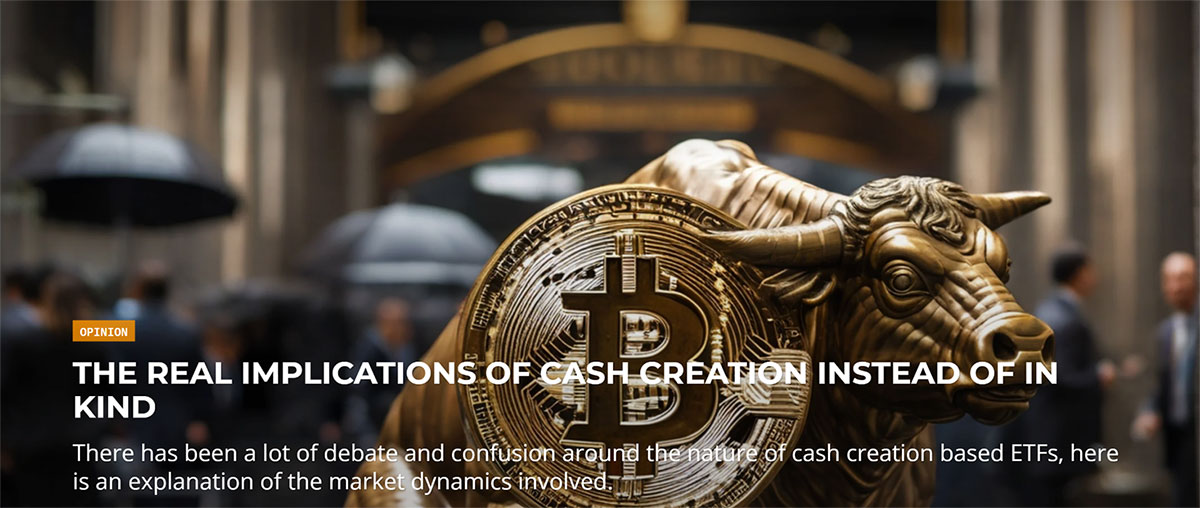
The landscape of spot Bitcoin ETFs is undergoing a significant shift, marked by a decisive move towards cash creation methodologies rather than the conventional "in kind" transfers. As the SEC actively engages with potential issuers, including recent meetings in December, this transformation introduces a dynamic that demands careful consideration. In this blog post, we delve into the implications of this change, exploring the market dynamics and shedding light on the intricacies that investors and industry participants should be mindful of.
Decoding the Cash Creation Dynamics:
The crux of the matter lies in the evolution of Exchange Traded Funds ("ETF") and the fundamental structure they entail. ETF issuers engage with Authorized Participants ("AP"), entities with the authority to exchange a predefined amount of the fund's assets for a fixed quantity of ETF shares. Traditionally, this exchange occurs "in kind," involving assets like stocks or bonds. However, the SEC's recent influence has led to a paradigm shift, favoring a cash creation mechanism for spot Bitcoin ETFs.
With cash creation, the issuer is obligated to publish the real-time cash amount required to acquire a specific quantity of Bitcoin. This dynamic, tied to the fluctuating price of Bitcoin, adds a layer of complexity to the creation and redemption process. Contrary to some misconceptions, the adoption of cash creation does not imply that the fund won't be backed 100% by Bitcoin. Instead, it introduces a brief delay after creation, where the issuer may need to acquire the Bitcoin, posing a potential risk if the acquisition cost exceeds the quoted price.
Incentives and Spreads in Cash Creation:
One intriguing aspect of cash creation is the incentive structure it introduces for issuers. The quoted cash amount for creation and redemption sets the stage for a delicate balance. Issuers face the challenge of offering a tight spread between these cash amounts while ensuring their ability to trade at or better than the quoted prices. This necessitates sophisticated technology, and the choice of exchanges for trading becomes a critical factor.
Consider an example where the cost of purchasing 100 Bitcoin on a single exchange is compared with a strategy using four regulated U.S. exchanges. The cost difference highlights the technology hurdle faced by issuers, emphasizing the need for efficient trading solutions. Access to superior trading technology enables issuers to offer tighter spreads and potentially outperform competitors.
SEC's Rationale and Regulatory Landscape:
The SEC's push towards cash creation is rooted in the regulatory landscape. Authorized Participants, by rule, are broker-dealers regulated by the SEC and bodies like FINRA. The SEC's decision aligns with the current status quo where regulated broker-dealers are not approved to trade spot Bitcoin directly. This regulatory consideration provides a clear explanation for the SEC's preference for cash creation over the "in kind" process.
Variation Among Issuers and Investor Considerations:
Looking ahead, investors should be attuned to potential variations among issuers in their approach to quoting and trading the creation and redemption process. The choices made by each issuer will likely result in varying pricing and costs, introducing a nuanced landscape for investors to navigate. Beyond cash creation, other factors such as custodial processes and fees should also be thoroughly researched to make well-informed investment decisions.
A Major Step Forward with Considerations:
Spot Bitcoin ETFs represent a significant advancement for the Bitcoin industry, offering investors exposure to the digital asset within a regulated framework. However, as David Weisberger aptly notes, the devil is in the details. Investors and market participants should not only be aware of the chosen mechanisms for quoting and trading but also consider factors like custodial processes and fees.
In conclusion, the transition to cash creation in spot Bitcoin ETFs marks a pivotal moment in the evolution of cryptocurrency in traditional financial markets. As the industry takes this major step forward, understanding the intricacies and nuances becomes paramount for all stakeholders. The forthcoming era of spot Bitcoin ETFs holds promise, but the informed investor will be the one best positioned to navigate this evolving landscape.
This article is inspired by the insights of David Weisberger.
The Real Implications of Cash Creation instead of In Kind
Disclaimer
An offering statement regarding this offering has been filed with the SEC. The SEC has qualified that offering statement, which only means that the company may make sales of the securities described by the offering statement. It does not mean that the SEC has approved, passed upon the merits or passed upon the accuracy or completeness of the information in the offering statement. The offering circular that is part of that offering statement is at https://vdr.ohanae.com/projects/ohanae. You should read the offering circular before making any investment.
Ohanae Securities LLC is a subsidiary of Ohanae, Inc. and member of FINRA/SIPC. Additional information about Ohanae Securities LLC can be found on BrokerCheck. Ohanae Securities LLC is in discussions with FINRA about exploring the expansion of business lines for the broker/dealer. Any statements regarding abilities of Ohanae Securities LLC are subject to FINRA approval and there are no guarantees FINRA will approve the broker/dealer’s expansion.
Ohanae Securities is seeking approval to be a special purpose broker-dealer that is performing the full set of broker-dealer functions with respect to digital asset securities – including maintaining custody of these assets – in a manner that addresses the unique attributes of digital asset securities and minimizes risk to investors and other market participants. If approved, Ohanae Securities will limit its business to digital asset securities to isolate risk and having policies and procedures to, among other things, assess a given digital asset security’s distributed ledger technology and protect the private keys necessary to transfer the digital asset security.